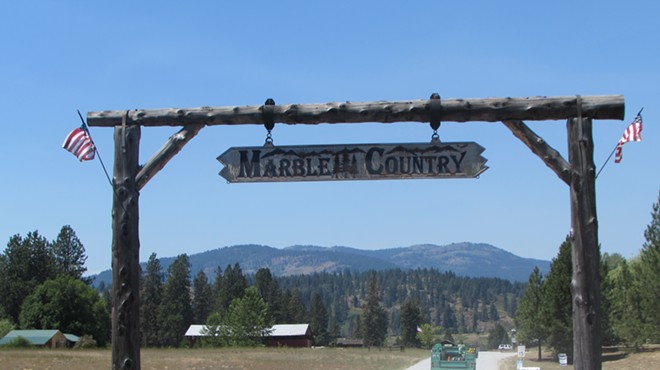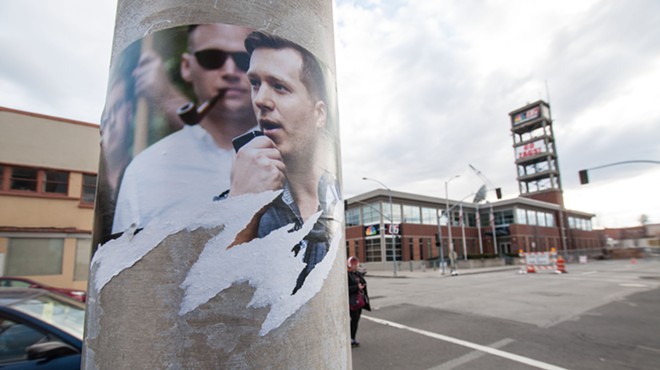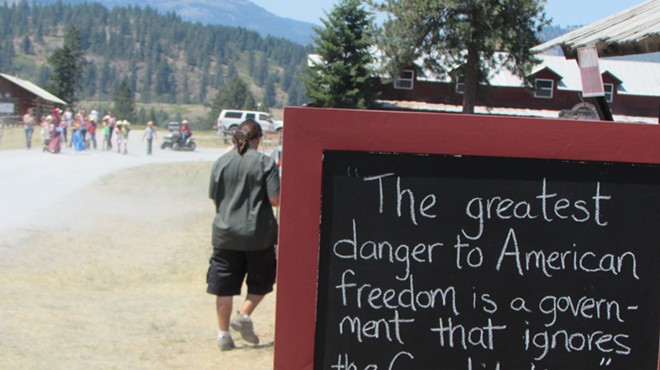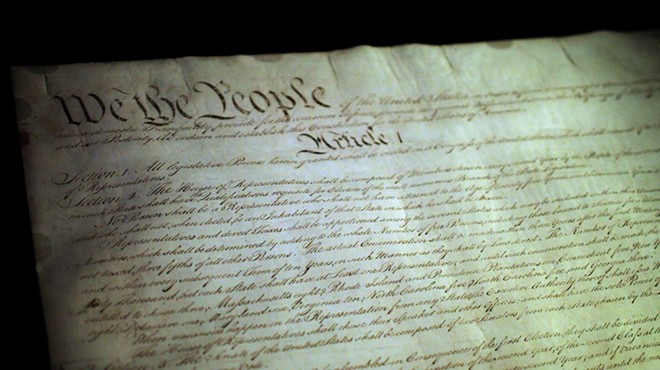Wednesday, September 16, 2015
Is this pastor, speaking at Turning Point Open Bible Church Oct. 1, totally racist?
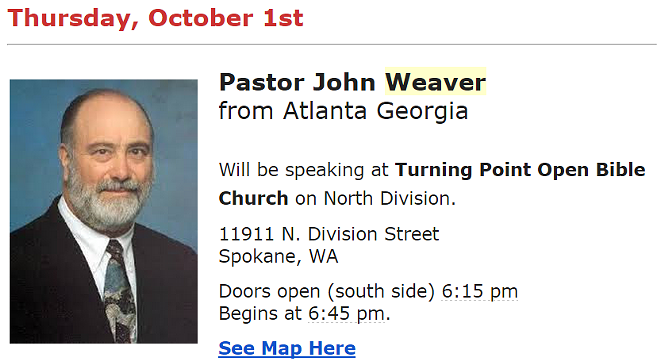
How do you define someone as racist? Celebrating the Confederate battle flag? Idolizing the Confederacy? Being part of an infamously racist group? Preaching against interracial marriage? Defending slavery?
All of the above? Well, then you’d have John Weaver, a Georgian pastor who’s scheduled to speak at Turning Point Open Bible Church on October 1, who meets all those criteria.
If you recognized the name “John Weaver,” it’s because the Inlander raised concerns about him in a recent cover story for speaking at the Marble Country's 21st Annual God and Country Celebration.
On October 3 and 4th Weaver will speak again at the “Old Paths Christian History Conference” at the Red Lion hotel in Post Falls.
The conference, sponsored by the Lordship Church in Coeur d’Alene, advertises that “an expositor of God’s entire word, Weaver’s preaching style is in the tradition of those early Colonial patriot pastors whose pupils were the cradle of America’s Liberty.” Kalispell, Montana, pastor Chuck Baldwin, a big fan of Weaver (and local Rep. Matt Shea), is also speaking at the conference.
The Northwest Grassroots, a local libertarian group, advertised both events in their newsletter. (Cecily Wright of Northwest Grassroots says they aren't their events, they’re just passing along event information. She says the Grassroots may videotape the talk, as they did when he gave a comparatively uncontroversial talk about God's judgment earlier this year.)
But I did speak with Margo Beal, the retired woman who invited Weaver to speak at Turning Point Open Bible. She said the Turning Point wasn’t officially connected with the event, just offered
She says Weaver’s come out to Spokane for the last five or so years to deliver sermons. “He’s speaking about very pertinent things right now that are important,” Beal says.
I talked with Beal a bit about why she invited Weaver, who has preached ideas many would consider racist. She was very kind, polite and friendly on the phone, even as I pressed her on Weaver’s quotes.
“I know John Weaver very well, and he is the most gracious, wonderful man,” Beal says. “He is so far from racist. He definitely believes not so much in the Confederacy, but the principles of state rights over a centralized government that can be more tyrannical. That’s where he comes from.”
I push her on a few things, shared some controversial things Weaver has said, and let her know I’m writing a piece critical of him.
“You can always pick and choose quotes. You can build a whole case, you can turn people,” Beal says. “Please be careful to not defame him in any way. He’s a very gracious man. I can assure you with all my heart that the things he has said have helped people to love God and mankind more.”
So what has he said?
Celebrating the Confederate Battle Flag
One of the lectures Weaver’s giving in Coeur d’Alene is titled “On the Enmity and Ignorance concerning the Confederate Battle Flag.” And no, it’s not on the ignorance of those who would fly the Confederate flag. On those who would criticize it. Weaver’s sermons on the Confederate Flag have been seized upon across the country by neo-confederates and Confederate flag lovers across the country.
“You see the Confederate Battle Flag is not a racist symbol, and it never has been,” Weaver says in a sermon condemning Lincoln and glorifying the south. “If you want racism, if you want hatred, if you want white supremacy, I will tell you where to find it - under the Stars and Stripes, the U.S. Flag. Not under the Confederate Flag.”
…
Why must Confederate symbols and monuments and heritage be defamed, destroyed and derided? I'll tell you why. Because if we are allowed to keep our symbols, we might just one day begin to inquire into the origin and meaning of those symbols. And in so doing, begin to questions the myths and the propaganda of the political correctness that's in our country today and as we see the truth, we might actually begin to stand for the principles for which our forefathers stood and fought. And my, would that cause problems for the present day administration and the present day Socialist program. Now listen to me folks, in order to keep a people enslaved and content in the present, you must destroy their past. A people, who have no past, will have no future.
…
”Let me tell you something folks, I would trade the culture we have today in a heartbeat for the culture that the South had before the War of Northern Aggression. I would trade the character that men have today for the character that men had before the War of Northern Aggression in a heartbeat. I would trade the morality today for the morality that was in the South before the War of Northern Aggression. We better stand in the way and soon ask for the old ways, which is the good way. We not only need to keep our symbols, we need to defend their principles and apply those principles in our present day life.”
Rather than rebutting Weaver’s lengthy sermon point by point, suffice it to say, there are many clear explanations as to why the Confederate battle flag was and is a symbol of racism. It was used by the confederates in their war to preserve the enslavement of black people, by Strom Thurmond in 1948 as a symbol of defiance against civil rights legislation, by Governor George Wallace to protest desegregation in 1963, by the KKK throughout its entire history, and by Charleston shooter
Weaver’s ideology goes further, however: "It's not enough to raise the Confederate flag," Weaver shouted at a 2009 rally in Tampa. "We must raise Confederates!"
Idolizing the Confederacy
Weaver preaches that the Civil War was not about slavery at all, but rather purely about tariffs, state’s rights and Northern tyranny. (The simplest counterpoint is to read the words of the states who were seceding.) But he doesn’t just flirt with Confederacy.
He’s preached sermon after sermon, praising Confederate generals, politicians, and soldiers. Confederate General Stonewall Jackson. Riley Crawford. Manse Jolly. One of the first leaders of the KKK, Nathan Bedford Forrest.
And of course, he loves Confederate President Jefferson Davis, the man who once called slavery a “moral, social and political blessing.”
He reads glowingly from the introduction of Georgia’s secession document, (skipping the part about defending slavery.)
“It’s amazing! When you read these succession documents, it’s almost like reading the Declaration of Independence,” he says.
“Let me say it again!” Weaver preaches. “The south did not believe
“The cause of the South is the cause of us all,” Weaver says, quoting Alexander Hamilton Stephens, the Vice-President of the Confederacy, in a 2006 sermon titled “Why the South must rise again.”
“In other words, we’ve got to realize what we lost in the War of Northern Aggression… If we don’t realize that, folks, there will never be an awakening of this country,” Weaver says. “There is no alternative. The South must rise again, and seek to restore our liberties, our rights, our constitution, and our common sense.”
Weaver doesn’t mention what Alexander Hamilton Stephens said the fundamental cause of the south
“The prevailing ideas entertained by [Jefferson] and most of the leading statesmen at the time of the formation of the old constitution, were that the enslavement of the African was in violation of the laws of nature; that it was wrong in principle, socially, morally, and politically.
…
Our new government is founded upon exactly the opposite idea; its foundations are laid, its corner- stone rests, upon the great truth that the negro is not equal to the white man; that slavery subordination to the superior race is his natural and normal condition.”
Many of his quotes, perhaps, could be excused as simply a skewed historical perspective. The bigger question is, what does Weaver believe about minorities in the present day?
Well, he doesn’t think they should marry white people. He got his bachelor's in theology from Bob Jones University, which had famously banned interracial dating.
In one infamous sermon, Weaver compared interracial marriage to
I believe it should be obvious to anyone who believes the Bible that God created the races. Had God desired only one race, he would not have created the other races. And if God had desired that we intermarry and amalgamate and become one, why would he have begun the other races to begin with? Very obviously it was not his desire that we intermarry. Because when you intermarry what you do then is basically destroy the races. You cannot maintain the differences.
One of the principles that is laid down very plainly in the book of Genesis, what God created is that everything was to bring forth fruit after its kind. Now that's very simple. Now how in the world can you bring forth fruit after your kind if you intermarry? The answer is you can't. You produce a different kind. Now let me just make a statement and then I want to show it to you from the Bible. You see the amalgamation of races is a form of adultery.
…
Now I'm not trying to sound racist, nor am I being racist. I'm simply, pointing out a fact, and here is the fact, this country was founded by White European Christians who wanted to establish a Christian culture. Not an African culture. Not an Oriental culture. Not a Muslim culture. Not a Mexican culture. But a Christian culture. And it was this Christian culture that was to be passed down to our posterity. Now what is happening in America? Are you listening? The exact same thing that happened in Israel. Interracial marriage, idolatry, and multi-culturalism.
“For myself, first of all, and knowing John, as a Christian,I believe so much that God brings unity by diversity, and God created every culture with
When I tell her that Weaver compared it to adultery, she says she’d have to ask him about that.
Being part of an infamously racist group
The Southern Poverty Law Center, an anti-hate group, has known about John Weaver for years and profiled him on its website.
For years, Weaver was a leading member of the Council of Conservative Citizens, a hate group that opposes interracial marriage and has described black people as a “retrograde species of humanity.” He also long served as chaplain to the Southern heritage group Sons of Confederate Veterans at a time when its leadership was largely controlled by racist extremists.
The Council of Conservative Citizens was the group that radicalized Charleston shooter
“Almost 15 years ago, we did a series of articles on who were the Council of Conservative Citizens,” Potok says.“We had years and years and years of the copies of the Citizen’s Informer, [the CCC’s newsletter]. It was there that it came out.”
Plenty of other sources confirm Weaver’s role as chaplain for the SCV, which hasn't traditionally carried the racist ideology of the CCC.
And whether Weaver intended his beliefs to be White Supremacist or not, racists love him.
Defending slavery
Weaver often argues that the Civil War was not fought over slavery, Confederate testimony to the contrary. But in 1998, he preached a series of 14 sermons going further, specifically defending slavery.
And not just slavery practiced by the Israelites in the Old Testament, but the slavery of the South in the 1800s. He casts the abolitionists, and their abolitionist theology, as a sinister force “destroying the country.”
These sermons were so nationally controversial that WalMart and other chains boycotting Maurice's All Natural Gourmet Blend BBQ Sauce, in part because their owner carried a Weaver tract based on this sermon series.
“The world — the humanist, the abolitionist — condemns slavery that is something vile and wicked in and of itself,” Weaver says. “Whereas the Word of God certainly does not do so. The Bible allows for slavery… Is God right or is the humanist right? Is the Bible right or is the humanist right?”
He suggests there is a “pagan” slavery and a “biblical” slavery. He says selling someone into slavery was condemned, but places the blame on “African kings,” for kidnapping and selling Africans into slavery.
But owning slaves? That’s okay.
“It is strange but true,” Weaver says. “The North condemned the South for doing what the Bible allowed. That is to hold slaves, as long as they’re treated biblically. And the north, who violated the scripture in selling men into slavery, receives no condemnation.”
He disputes abolitionist narratives of abuse of slaves. Most Southern men, he says, “took care of their slaves.”
Heck, most slaves stayed on with their masters after the war was over, Weaver says.
Could you whip your slaves? Sure, he says, but only for very serious offenses. “The slave could be beaten,” Weaver says. “He could be whipped. He could be flogged by the master.”
And yes, he preached, it is biblical to call your slaves “property.”
“Before everyone gets upset for referring to slaves as property, which they did in the 1860s,” Weaver said. “May I remind you that in the Bible, even a wife was referred to as property.”
In fact, Weaver argues, slaves were sometimes considered member of the family. They even shared the last name of their owners! he says.
“I’ve forgotten her name, but one of the elderly slave women said this, and I’m quoting her exact words. She was longing for the plantation days, and she said this. ‘When us was slaves, we was somebody,” Weaver says. “Now we ain’t nothing but ni—-ers”
And yes, Weaver actually said the n-word.
I asked Beal about all of this.
”The truth is, the civil war just enlarged the plantation,” Beal says. “We’re all slaves. We’re a bunch of slaves. We’re so full of debt. We’re dependent on the government. I think slavery’s very sad, and it’s just growing and growing.”
But what does Weaver think about Jews?
Here’s a sermon where he argues that Jesus was not a Jew:
“Now, I know that it’s not politically correct to refer to the scriptural fact that the Jews crucified Christ. But it is a scriptural fact.” Weaver said in a 2007 sermon titled The Sin of the Jews. “Many Christians try to water down that subject, and they say, well, we kind of all crucified him, because we died for the sins of his people … But the scriptures are very specific. And I want you to know how over and over they tell us it was the Jews who crucified Christ… It was the Jews who hated him. It was the Jews who sought his life. It was the Jews who delivered him up unto Pilot. It was the Jews who demanded he be crucified.”
He repeats these ideas often:
“I want you to see that Judaism and Christianity are opposites!” he says. “There is no such animal as a Judeo-Christian religion. It cannot possibly be.”
How about American Indians?
In an aside in one of his slavery messages, Weaver says this: “By the way, I hope you do know that the Indians were not the original settlers on this continent. There was a Little People, and the Indians not only killed them, and took it, they ate them. They cannibalized, were cannibals.”
Does John Weaver also have strong opinions on what the Bible says about beards?
Tags: Racism; john weaver; matt shea , News , Image






